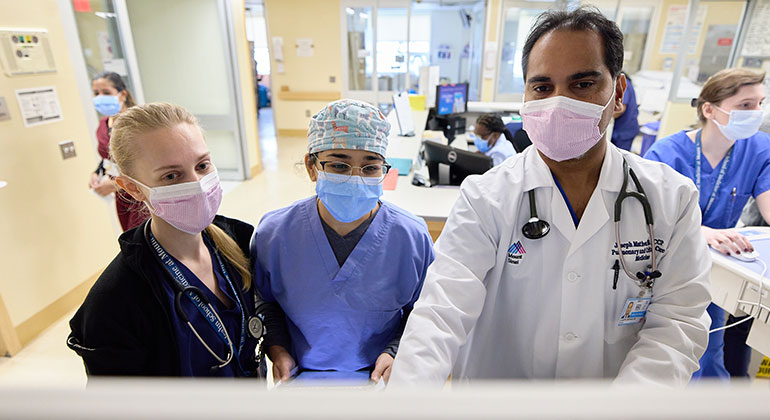
Mount Sinai West Medical/Surgical Intensive Care Unit
Some people need intensive monitoring because of a critical illness or after surgery. At Mount Sinai West, we provide this care in our Medical/Surgical Intensive Care Unit (M/SICU). We address a wide range of conditions including:
- Congestive heart failure
- Excessive bleeding (hemorrhage)
- Hematological and neurology emergencies
- Kidney failure
- Low blood pressure (shock)
- Pneumonia
- Respiratory failure
- Sepsis
On the surgical side, we treat conditions such as:
- Abdominal compartment syndrome
- Gastrointestinal ischemia or bleeding
- Perforated ulcers
- Pregnancy (obstetric) emergencies
- Skin and soft tissue infections
We also care for patients who need close monitoring and treatment after complex surgeries. This includes vascular, thoracic, oncologic, and orthopedic procedures.
These units have the latest technology and equipment. We have machines for continuous renal replacement therapy and targeted temperature management. To view your airways, we use videolaryngoscopes and disposable bronchoscopes. We can perform ultrasound imaging right at your bedside. And, because we are associated with the Icahn School of Medicine at Mount Sinai, we use the latest techniques and approaches. We have 23 private patient rooms in the unit.
Our Team
We work as a team to give you the best possible care. Our doctors specialize in critical care, pulmonology, anesthesiology, general surgery, and internal medicine. Our registered nurses and aides are trained in advanced life support. We also have highly skilled respiratory therapists, physical therapists, dieticians, and speech language pathologists.
In addition, we work closely with other experts at the hospital. This includes heart doctors, interventional radiologists, anesthesiologists, surgeons, and infectious disease specialists. We also consult with chaplains, social workers, and patient relations experts. Telemedicine lets us get advice from specialists throughout the Mount Sinai Health System. We can talk to them using a robotic device right at your bedside.
When appropriate, our team works closely with the hospital’s palliative care services. This program helps people with longterm critical illnesses. We try to ease symptoms, talk with you and your family about goals for care, and address end-of-life issues.
Every step of the way, we work closely with your loved ones. We provide daily updates. We coordinate with social work, spiritual care, patient relations, and other departments. We strive to give you as much support as possible. If you ever have a question or need more information, don’t hesitate to ask. We are here to help.
Rules for Visitors
Our visitor policies change periodically. Feel free to reach out to us at 212-523-4000 with any questions.